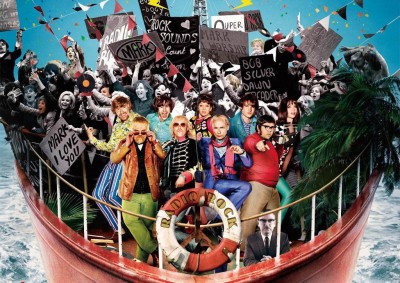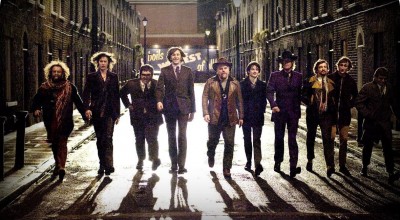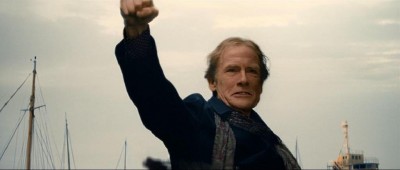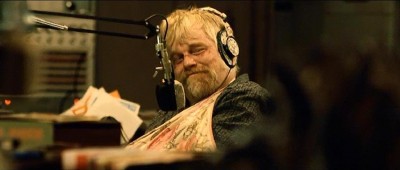
Pirate Radio—or as it was originally called in the UK The Boat That Rocked (the version being shown here)—is not a film that is likely to show up in too many Philip Seymour Hoffman retrospectives, and that’s a great pity for a number of reasons. First of all, it contains what may just be Hoffman’s most purely likable performance (one that is seemingly grounded a little in his Lester Bangs). It’s warm, uncomplicated, completely relaxed—and its simply a treat to see Hoffman so obviously having a good time. This is not a deep film in the usual sense of the word. However, it not only contains what is perhaps Hoffman’s most lovable performance—it’s a performance that works because of the humanity he invests in the character.

Strangely, it’s this performance and one particular scene that has kept creeping into my mind since Hoffman’s death was announced. If you don’t know the film, it’s a scene that comes very near the end where Hoffman’s character, The Count, is giving what looks like his last broadcast from the sinking pirate radio ship. In it he notes, “Nothing important dies tonight—just a few ugly guys on a crappy ship. The only sadness tonight is that in future years, there’ll be so many fantastic songs that it will not be our privilege to play, but believe you me, they will still be written, they will still be sung, and they will be the wonder of the world.” Hoffman’s legacy is already the wonder of the world. The sadness is that he had so many more fantastic songs in him that we will never witness. I think he would have appreciated being remembered this way.

I fell in love with this film right away in its abbreviated and reshaped form as Pirate Radio, but I also noticed that The Small Faces’ “Lazy Sunday” was listed among the songs in the credits. Well, I certainly didn’t hear it, so I asked the only person I knew who had seen the film as The Boat That Rocked—an Australian (in fact, Young Jeremy Dylan, who used to do the art work for the “Elitist Bastards” podcasts). His answer was, “During the pub crawl.” What pub crawl? There was no pub crawl in the film I’d seen. So, being a good lad, Jeremy sent me an Australian copy of The Boat That Rocked—and, lo and behold, there it was. And really turned out to be a key scene, since Curtis presented it in the style of one of Richard Lester’s 1960s films. It really added something to the film. (And it kind of made up for the fact that Curtis couldn’t afford any Beatles songs—at least, it evoked their director.)

But that wasn’t the only difference. Not only was this version nearly 20 minutes longer, the film was often edited differently and sometimes different songs were used. For those who put stock in this sort of selling point, the original version contains a scene with “the sexiest man on the planet,” Midnight Mark (Tom Wisdom), adrift in a roomful of naked female fans. (It’s actually the final gag of an entire cut sequence.) The most notable editing change, though, corrected something I always felt was wrong. Pirate Radio ends with a freeze frame of Young Carl (Tom Sturridge). That seemed off to me. It ought to have ended on a freeze frame of Quentin (Bill Nighy) right as he says, “Rock and roll.” Guess what? Curtis’ original cut does. It’s altogether a smoother, better experience.

Neither version, by the way, is intended to be taken too literally, especially where the soundtrack is concerned. The film is designed as a statement on—and a love letter to—classic rock music. It’s all about how the music touches us, binds us to each other, and holds us together. As a result, the music was clearly chosen for maximum impact. If you’re the kind of person who gets all bent out of shape over the fact that a great deal of the music wasn’t recorded till after the events of the movie, then The Boat That Rocked is going to annoy you. (And if you bitch about it, you’re going to annoy me.) It is concerned with being true in spirit. That seems so much more important to me.
The Asheville Film Society will screen Pirate Radio (The Boat That Rocked) Tuesday, March 25, at 8 p.m. in Theater Six at The Carolina Asheville and will be hosted by Xpress movie critics Ken Hanke and Justin Souther.



Before you comment
The comments section is here to provide a platform for civil dialogue on the issues we face together as a local community. Xpress is committed to offering this platform for all voices, but when the tone of the discussion gets nasty or strays off topic, we believe many people choose not to participate. Xpress editors are determined to moderate comments to ensure a constructive interchange is maintained. All comments judged not to be in keeping with the spirit of civil discourse will be removed and repeat violators will be banned. See here for our terms of service. Thank you for being part of this effort to promote respectful discussion.